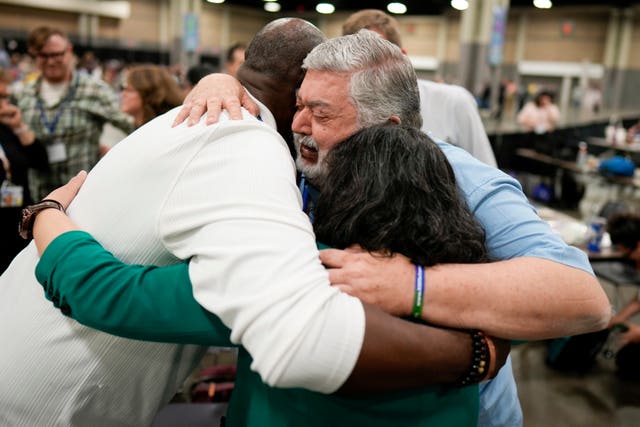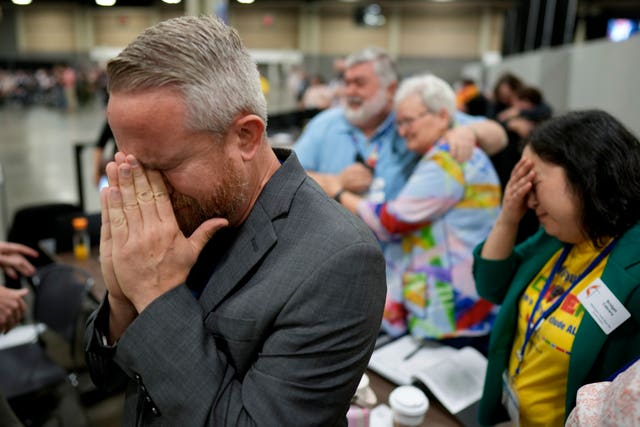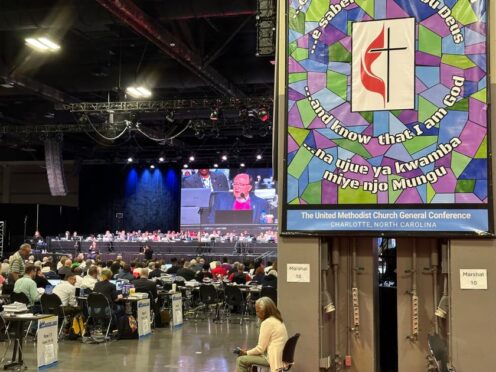United Methodist delegates in the US repealed their church’s longstanding ban on LGBT clergy with no debate on Wednesday, removing a rule forbidding “self-avowed practising homosexuals” from being ordained or appointed as ministers.
Delegates voted 692-51 at their General Conference — the first such legislative gathering in five years.
That overwhelming margin contrasts sharply with the decades of controversy around the issue.
Past General Conferences of the United Methodist Church had steadily reinforced the ban and related penalties amid debate and protests, but many of the conservatives who had previously upheld the ban have left the denomination in recent years, and this General Conference has moved in a progressive direction.

Applause broke out in parts of the convention hall on Wednesday after the vote. A group of observers from LGBT advocacy groups embraced, some in tears. “Thanks be to God,” said one.
The change does not mandate or even explicitly affirm LGBT clergy, but it means the church no longer forbids them.
It is possible that the change will mainly apply to US churches, since United Methodist bodies in other countries, such as in Africa, have the right to impose the rules for their own regions. The measure takes effect immediately upon the conclusion of General Conference, scheduled for Friday.
The consensus was so overwhelming that it was rolled into a “consent calendar”, a package of normally non-controversial measures that are bundled into a single vote to save time.
Also approved was a measure that forbids district superintendents — a regional administrator — from penalising clergy for either performing a same-sex wedding or for refraining from performing one.

It also forbids superintendents from forbidding or requiring a church from hosting a same-sex wedding.
That measure further removes scaffolding around the various LGBT bans that have been embedded in various parts of official church law and policy. On Tuesday, delegates had begun taking steps to dismantle such policies.
Delegates are also expected to vote as soon as Wednesday on whether to replace their existing official Social Principles with a new document that no longer calls the “practice of homosexuality … incompatible with Christian teaching” and that now defines marriage as between “two people of faith” rather than between a man and a woman.
The changes are historic in a denomination that has debated LGBT issues for more than half a century at its General Conferences, which typically meet every four years.
On Tuesday, delegates voted to remove mandatory penalties for conducting same-sex marriages and to remove their denomination’s bans on considering LGBT candidates for ministry and on funding for gay-friendly ministries.
About 100 LGBT people and allies gathered outside the Charlotte Convention Centre after the vote — many with rainbow-coloured scarves and umbrellas — to celebrate, pray and sing praise songs accompanied by a drum.
Bishop Karen Oliveto, the first openly lesbian bishop in the United Methodist Church, was among those celebrating.
“It seemed like such a simple vote, but it carried so much weight and power, as 50 years of restricting the Holy Spirit’s call on people’s lives has been lifted,” said Ms Oliveto, of the Mountain Sky Episcopal Area, which includes Colorado, Montana, Utah and Wyoming.
“People can live fully into their call without fear. The church we’ve loved has found a home for us.”
Angie Cox, an observer at the meeting from Ohio, said she has gone before her conference’s board of ordained ministry six times but was “told no just because of the prohibition on LGBTQ clergy”.
She said Wednesday’s vote “means I might be able finally to live fully into my calling.”
Tracy Merrick, a delegate from Pittsburgh who has advocated for LGBT inclusion at several previous conferences, said that there were “many times when I thought we would never see this day”.
The vote, he said, enables the church to become “the denomination that many of us had envisioned for years”.
At the same time, it comes following the departure of one-quarter of the US churches within the UMC. And it could also prompt departures of some international churches, particularly in Africa, where more conservative sexual values prevail and where same-sex activity is criminalised in some countries.
Last week, the conference endorsed a regionalisation plan that essentially would allow the churches of the United States the same autonomy as other regions of the global church.
That change — which still requires local ratification — could create a scenario where LGBT clergy and same-sex marriage are allowed in the US but not in other regions.
More than 7,600 mostly conservative congregations in the US disaffiliated between 2019 and 2023 reflecting dismay over the denomination not enforcing its bans on same-sex marriage and LGBT ordination.
The conference last week also approved the departure of a small group of conservative churches in the former Soviet Union.
The denomination had until recently been the third largest in the US, present in almost every county. But its 5.4 million US membership in 2022 is expected to drop once the 2023 departures are factored in.
The denomination also counts 4.6 million members in other countries, mainly in Africa, though earlier estimates have been higher.
